Chair's Message
 December, I have been meeting with and renewing contact with many industry, government, First Nations, community and non-government organization representatives. Establishing lines of communication and building relationships are important to me, as this facilitates the sharing of perspectives, areas of concern and priorities and allows me to communicate what we do, what we have done and where we are headed. If your community or group would like to meet with me when I visit your area, or if you are in the Vancouver or Victoria area and would like to schedule a meeting, please let me know.
December, I have been meeting with and renewing contact with many industry, government, First Nations, community and non-government organization representatives. Establishing lines of communication and building relationships are important to me, as this facilitates the sharing of perspectives, areas of concern and priorities and allows me to communicate what we do, what we have done and where we are headed. If your community or group would like to meet with me when I visit your area, or if you are in the Vancouver or Victoria area and would like to schedule a meeting, please let me know.
During the course of its business, the Board regularly observes multiple land uses and practices on the land base, often in very close proximity to forest and range activities. Through memorandums of understanding with the Ministry of Forests, Lands and Natural Resource Operations and other regulators, the Board’s audit and oversight expertise is occasionally sought to report to the public on non-forestry and range related land uses, practice concerns and impacts on the forest landscape. Oversight helps to drive consistent, good land use practices and improvements across the landscape, no matter the land user or regulator. Independent oversight is good public policy that builds accountability and public trust.
This issue of the Eye has a lot in it because of the volume of reports published in the last six months. Please refer to our website for more information, and please share your thoughts and concerns with us through Email, Facebook or Twitter.
Survey Says
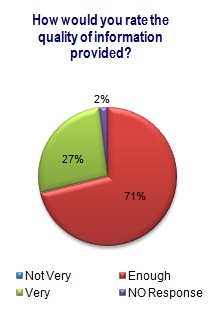
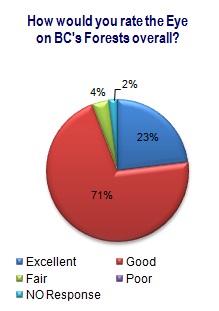 You like the Eye! 71% of survey respondents rated the newsletter as good and 23% rated it excellent. 27% said the content is very relevant / interesting and 71% said it is good. Half of the survey respondents said they would like to see the newsletter come out quarterly instead of twice a year. We are thinking about increasing our frequency, as long as we have enough relevant and interesting information to share. You also gave us some excellent feedback on the types of content you would like to see more of and we try to address some of those requests in this latest issue. Thanks to everyone who took the time to respond to the survey. And congratulations to Doug M., winner of the pine beetle bowl.
You like the Eye! 71% of survey respondents rated the newsletter as good and 23% rated it excellent. 27% said the content is very relevant / interesting and 71% said it is good. Half of the survey respondents said they would like to see the newsletter come out quarterly instead of twice a year. We are thinking about increasing our frequency, as long as we have enough relevant and interesting information to share. You also gave us some excellent feedback on the types of content you would like to see more of and we try to address some of those requests in this latest issue. Thanks to everyone who took the time to respond to the survey. And congratulations to Doug M., winner of the pine beetle bowl.
Summary of Recent Reports
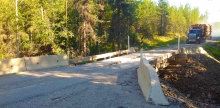 The last six months have been unusually busy in terms of reports published by the Board. You may have felt overwhelmed with the pace of our report releases at times and we apologize for that. It was a difficult balance between not holding up completed work, while not losing the important findings in the multitude of publications being released. It just so happened that a number of major projects were wrapping up at the same time as a number of strategic bulletins and reports that came out of our November 2012 strategic plan.
The last six months have been unusually busy in terms of reports published by the Board. You may have felt overwhelmed with the pace of our report releases at times and we apologize for that. It was a difficult balance between not holding up completed work, while not losing the important findings in the multitude of publications being released. It just so happened that a number of major projects were wrapping up at the same time as a number of strategic bulletins and reports that came out of our November 2012 strategic plan.
So just in case you missed anything, here is a brief recap.
January
One complaint investigation report was published at the end of January, involving logging and its’ relationship to flooding on private property, finding that legal requirements were met, that planning related to hydrological impacts of logging was appropriate and that it was not possible to determine the extent to which logging activity may have contributed to flooding.
February
Three reports were published. An audit of BCTS operations near Terrace found compliance by the timber sales program and timber sale licence holders, with one exception. An audit of a woodlot on Southern Vancouver Island found all activities in compliance, except for requirements to report to government. A complaint investigation examining concerns about effects of livestock grazing and fencing blocking public access to a watercourse found the concerns were unfounded.
March
Five reports were published. The Board’s special investigation of bridges built between 2010 and 2013 found a surprising amount of non-compliance for bridges, as well as a number of bridges that posed possible safety concerns. The response to that report is discussed in this newsletter. At the same time, an audit of BCTS in Prince George and an audit of a woodlot on Southern Vancouver Island were released, both of which had two non-compliances, one each involving bridges.
The Board published its analysis of how well salvage logging of beetle killed pine trees is following the Chief Forester’s guidance to manage the mid-term timber supply. That investigation found that salvage harvesting is mostly consistent with the guidance, but in a few areas of the province, the salvage is nearly finished and the harvest of green timber is increasing. This represents a significant challenge to government and industry as they manage the transition to the post-salvage era. Finally, a special investigation that looked at how licensees are managing logging around karst features on Vancouver Island was released. This was a complex and difficult topic to examine and the Board hopes this report will lead to greater attention being paid to this important but poorly understood resource. The Board also published a bulletin discussing balancing of risk across resource values in decision-making under the Forest and Range Practices Act (FRPA).
April
Three reports were published, the most significant being the investigation of forest planning and practices in community watersheds. The investigation identified a number of improvements necessary to help ensure government objectives for drinking water quality and quantity are achieved. The status and management of community watersheds needs to be reviewed by government to ensure this resource is being properly managed in those places where it needs to be managed, in consideration of all types of development activity. Another report was published that summarizes the determinations government has made under FRPA between 2007 and 2013. This report falls under the Board’s mandate to look at appropriateness of government enforcement. This report gives an idea of the types of determinations that are being made and identifies common issues. A follow-up report will examine the actual appropriateness of penalties issued by government officials for failures to comply with FRPA. A complaint investigation involving logging in a community watershed above a residential development on Kootenay Lake was also published. The investigation found that, while the residents’ concerns are understandable, forest professionals had done a thorough job examining risk posed by the logging and that the likelihood of negative impacts is low.
May
The Board published its observations about how well FRPA is working, after nearly 10 years of implementation, concluding the FRPA framework has been partly implemented and is working in most situations. However, some aspects of implementation are not complete or are not working as well as expected and improvement is needed. For example, government objectives for forest and range values have not been fully established, forest stewardship plans have limited usefulness for either planning or the public engagement they are supposed to encourage, some forest practice requirements are not clear, and monitoring and evaluation of the effectiveness of practices could do more to encourage improvement to the regulations and operational performance.
A summary of the complaints investigated by the Board since its inception was also published. Since 1995, the board has responded to over 1100 concerns and 300 complaints, leading to 181 formal recommendations for improvement to forest and range planning, practices and public consultation. Topics most commonly complained about are conservation of forest values such as water, soundness of forest planning and practices and adequacy of both public involvement processes and government enforcement of the law.
Reaction to Reports
Timber Harvesting in Beetle-Affected Areas
Timber Harvesting in Beetle-Affected Areas
 This report on the forest industry’s harvesting of beetle-killed timber concluded that the forest industry continues to meet government’s expectation that harvesting should be focused on dead pine trees, but that focus appears to be diminishing and, in particular, the harvest of tree species other than pine is increasing more than expected in some areas of the province. This report has been met with significant interest in all quarters. We have received positive feedback on the work done to examine this pressing issue for the mid-term timber supply. Third party certification organizations have had discussions with Board staff to better understand the report and the findings, and Board staff have discussed details of the methods used in the report with Government staff at FLNR to assist them in the development of methods to monitor harvest performance in beetle affected areas. Many different stakeholders have referred to the Board report in their own communications with the public and media, illustrating the broad audience for this work. The Board is pleased with the response and the ongoing discussion that has resulted from this analysis.
This report on the forest industry’s harvesting of beetle-killed timber concluded that the forest industry continues to meet government’s expectation that harvesting should be focused on dead pine trees, but that focus appears to be diminishing and, in particular, the harvest of tree species other than pine is increasing more than expected in some areas of the province. This report has been met with significant interest in all quarters. We have received positive feedback on the work done to examine this pressing issue for the mid-term timber supply. Third party certification organizations have had discussions with Board staff to better understand the report and the findings, and Board staff have discussed details of the methods used in the report with Government staff at FLNR to assist them in the development of methods to monitor harvest performance in beetle affected areas. Many different stakeholders have referred to the Board report in their own communications with the public and media, illustrating the broad audience for this work. The Board is pleased with the response and the ongoing discussion that has resulted from this analysis.
Bridge Planning and Design
When this report was released in March of this year, it truly came as a wake-up call for the industry, government and the professional associations. The level of non-compliance with RPA and professional guidelines was a surprise and a concern to all. The Minister of Forests, Lands and Natural Resource Operations, Steve Thomson, reacted immediately with a call to industry and the associations for a 60-day action plan to deal with potential safety concerns. Recognizing that the Board’s investigation only looked at 5 districts of the 21 in the province, the Council of Forest Industries (COFI) also responded quickly and had its members review all bridges their company staff would have to cross as part of their travels in the forest. A number of companies and professionals contacted the Board directly to get more information on the location of problem structures and the issues found in the investigation. The Association of BC Forest Professionals and the Association of Professional Engineers and Geoscientists of BC both met with Board staff to review the investigation findings in more detail. Within 60-days, industry and both associations responded with an action plan, as requested by the Minister. The response was unprecedented for a Board report.
While the responses appropriately focused on the safety concerns identified, the Board would like to point out that the issues were largely the result of the failure of some licensees and professionals to follow the existing guidelines for stream crossings and the failure to plan and document crossing projects. Let us not lose sight of the importance of doing the proper work up front to avoid safety issues that can result. As safety concerns are addressed, we hope to see more attention turned to ensuring proper project planning and documentation is taking place.
Working with People to Resolve Concerns
Early in June, Board staff held a field trip with participants in a complaint investigation regarding the visual impacts of cutblocks harvested by the BC Timber Sales program in a watershed near Vernon, BC. BCTS staff and local residents attended and discussed the visual concerns of some of the residents and the opportunities for communication and input into harvest plans. Residents viewed the harvested blocks and BCTS staff explained the values and operational constraints that they consider and balance when planning blocks that are sold under the timber sale program. We are hopeful the meeting has led to a good relationship between the parties and that any concerns can be resolved without the need for a formal complaint investigation. This is a good example of the type of work staff often do to try and resolve concerns without having to go through a formal and sometimes lengthy complaint investigation process.
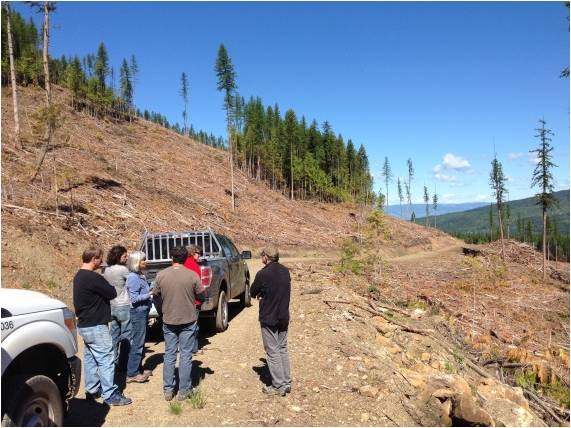
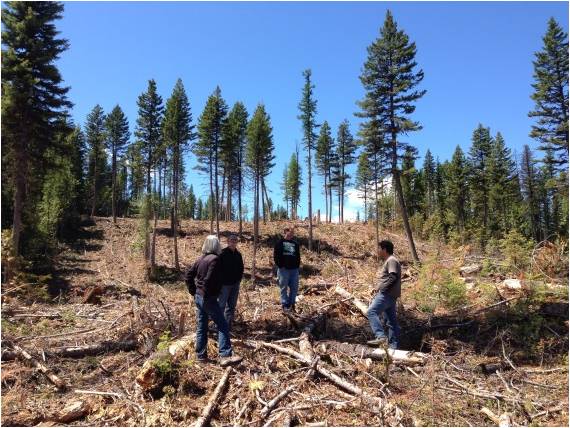
So You're Going to be Audited by the Board?
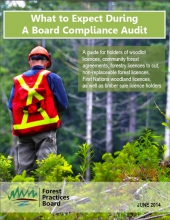 We have just released a new guideline, written for small licensees, such as community forest and woodlot tenure holders, that answers questions and provides advice on what to expect and how to prepare for a Board audit. The guideline is available on our website and may be of interest to other licensees in addition to woodlots and community forests.
We have just released a new guideline, written for small licensees, such as community forest and woodlot tenure holders, that answers questions and provides advice on what to expect and how to prepare for a Board audit. The guideline is available on our website and may be of interest to other licensees in addition to woodlots and community forests.
The first three audits of the field season are underway – Carrier Lumber in the Prince George District, BCTS in the Chilliwack business area, and Red Mountain Ski Resort. The Board plans to conduct 10 audits this summer. The others will be announced later this summer and fall, generally a week before the audit field work begins. Audit announcements can be found on the Board’s website.
Strategic Planning Meeting
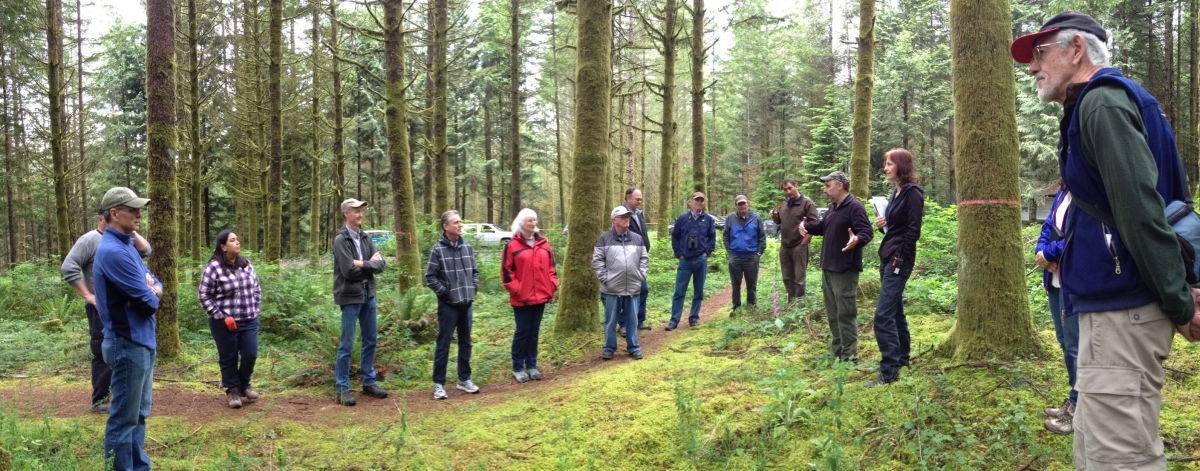
In early June, the Board held its quarterly meeting, spending 2 ½ days at Loon Lake in the University of British Columbia’s Malcolm Knapp Research Forest in Maple Ridge. The session began with an insightful afternoon discussion of current forestry issues in the province with Professors Gordon Weetman and Bruce Larson of UBC, Professor Ken Lertzman of Simon Fraser University, Ken Day (manager of UBC’s Alex Fraser research forest) and consultant Bruce Blackwell. The next day, the Board enjoyed an excellent tour of the research forest, led by manager Paul Lawson, forester Cheryl Power and Ionut Aron. The tour included stops at research sites, silviculture trial sites, an active logging operation, the onsite lumber mill, which takes trees from the research forest and produces custom value-added products for local customers in the Fraser Valley, and a chat with a student researcher doing work on sediment transfer and stream flows. The last day was the Board’s strategic planning session, where Board members and staff discussed the vision for the next three years and settled on three strategic priorities to guide upcoming work:
- Promote Stewardship
- Demonstrate Value
- Build Broader Expertise
These themes will help direct the work the Board carries out, demonstrate the value of the Board’s role and its work to the forest sector and all British Columbians, and increase the Board’s awareness and understanding of other resource sectors that work in and affect BC’s forest and range lands.
We would like to thank all of the individuals mentioned, and any we forgot to mention, for their generous contribution of time and enthusiasm to make the meeting such a success.


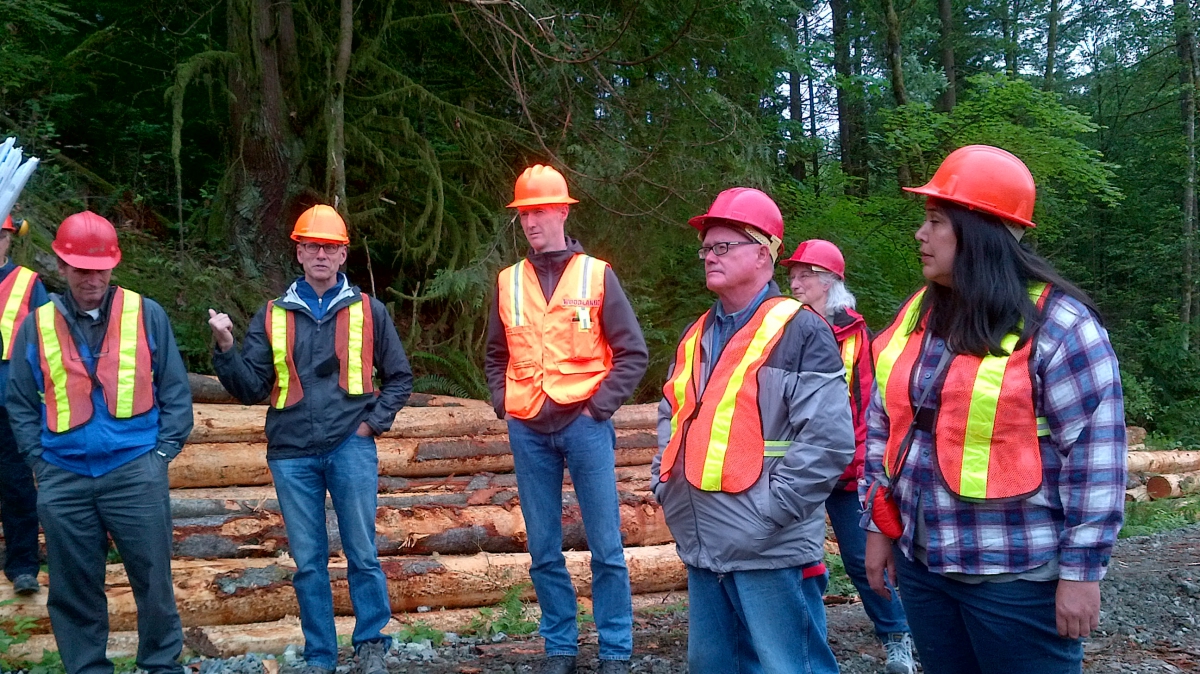
New Projects in the Works
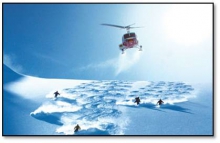 Access Management
Access Management
 Access Management
Access Management
In December 2005, the Board published the special report, Access Management in British Columbia: Issues and Opportunities, which concluded (among other things) that there was:
- no comprehensive inventory of resource roads;
- a confusing patchwork of legal requirements for road construction, maintenance, deactivation;
- potentially inequitable sharing, among industries, of road building costs and road use liabilities; and
- very limited opportunities for public involvement in access management planning.
Since then, resource development has grown significantly in the province, including expansion of the resource road network. More users on the land are leading to more conflicts between users of resource roads. Consolidated resource road legislation has been drafted, revised and continues to be discussed by government and stakeholders. The Board believes that an update of the 2005 report is timely and will assist in advancing the state of access management in British Columbia. Given the continuing issues with resource roads in the province, it is timely to review what has happened in the intervening years since this report was published.
This special report will assess the state of access management in British Columbia, with a primary focus on current legislation, policy, procedures and practices related to resource roads.
Board Provides Audit Services to Government for Heli/Cat Skiing Caribou Management
In 2011, the Ministry of Forests, Lands and Natural Resource Operations (FLNR), the Ministry of Environment and 12 heli/cat ski operators signed memorandums of understanding (MOUs) regarding the management of helicopter and snow-cat
skiing in mountain caribou habitat. The MOUs require the operators to work in a manner that is consistent with provincial objectives for mountain caribou recovery.1 The MOUs include provision for: conducting staff training; developing an information management system to capture mountain caribou information; adapting to caribou encounters; and reporting this information to FLNR each year.
The MOUs recognize independent audits as an important part of the caribou program in order to gain agency and public trust in the process and outcomes. In November 2013, the Forest Practices Board signed an agreement with FLNR, designating the board as the independent auditor for the MOUs. The Board will objectively and independently audit helicopter and snow-cat skiing operators, who operate in mountain caribou habitats and are signatories to the MOUs.
The Board plans to conduct two levels of auditing – a reporting audit (conformance) and a practices audit (effectiveness). The reporting audit is being done in the spring / summer of 2014, covering the 2013 /2014 ski season. Auditors will assess the operators’ conformance with the reporting requirements outlined in the MOUs. At the completion of the reporting audit, the Board will release the audit report to the public, including the results for each operator. A practices audit will not be conducted in 2014, but may be conducted in 2015.
___________________________
1 A Strategy for the Recovery of Mountain Caribou in BC http://www.env.gov.bc.ca/wld/documents/mtcaribou_rcvrystrat02.pdf
Upcoming Events
 IUFRO World Congress
IUFRO World Congress
 IUFRO World Congress
IUFRO World Congress
The Board will be participating in the IUFRO XXIV World Congress in Salt Lake City, Utah from October 5-12 this year. IUFRO is the International Union of Forest Research Organizations. This congress is also being held with the Canadian Institute of Forestry’s annual general meeting and the Society of American Foresters’ annual general meeting and will bring together thousands of forestry experts from around the world. It’s an excellent opportunity to showcase BC’s approaches to sound forest management and independent oversight.
The Board will be presenting a poster in a session on the Impact of Forest Certification on Sustainable Forest Management, titled “Is Forest Certification Contributing to Sustainable Forest Management in British Columbia?” This poster will illustrate the scope of certification in British Columbia and summarize the results of Board audits relative to certification status. The Board will also be presenting a paper on the topic of Communities, Forests, Forest Industries and Social Licence to Operate. The paper is titled “Obtaining and Maintaining Social Licence to Operate – BC’s Quality Assurance Model.” It will explore how BC’s quality assurance model fosters public confidence and contributes to the BC forest industry’s social licence to operate.
People
 In Memoriam
In Memoriam
 In Memoriam
In Memoriam
It is with great sadness that we report the passing of a good friend and valuable contractor to the Board, Edward John Armstrong, RPF. Ed passed away on April 30, 2014. Ed worked as an audit contractor from 1998 through 2011, until his health no longer allowed him to
conduct field work. Ed was one of those rare guys that could do anything – we had him auditing operational planning, roads, harvesting, silviculture – you name it, Ed could do it. Ed was always upbeat, had a constant smile on his face and was very respectful to all of the Board staff, fellow contractors, and all of the auditees he came in contact with. Ed was a great asset to the Board, a pleasure to work with, and he will be missed.
Board Member Changes
The Board is pleased to welcome Norma Wilson as a new part-time Board member. A professional geologist currently working on a PhD in recreation planning at the University of British Columbia, we welcome the recreation and public interest perspective Norma brings to the Board, as well as her experience and knowledge of the mining sector.
She has previously worked as executive director of the Outdoor Recreation Council of BC; a lay councillor with the Association of British Columbia Forest Professionals; a member of the McGregor Model Forest (Prince George); and the BC chair of the Canadian Parks & Wilderness Society.
The terms of several current Board members will be expiring later this year. Check out our website for more information at: https://www.bcfpb.ca/board/employment
Newbie in the Field
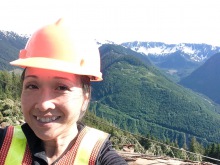 Have you ever wondered what auditors do when they are out in the field on an audit? Well, our Web & Social Media Manager, Kairry, was curious so we sent her out with our team of auditors for a day (of course equipped with a camera). Read what her first time experience in the field was like – A DAY IN THE FIELD ON AN AUDIT .
Have you ever wondered what auditors do when they are out in the field on an audit? Well, our Web & Social Media Manager, Kairry, was curious so we sent her out with our team of auditors for a day (of course equipped with a camera). Read what her first time experience in the field was like – A DAY IN THE FIELD ON AN AUDIT .


